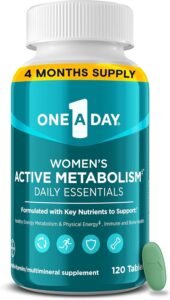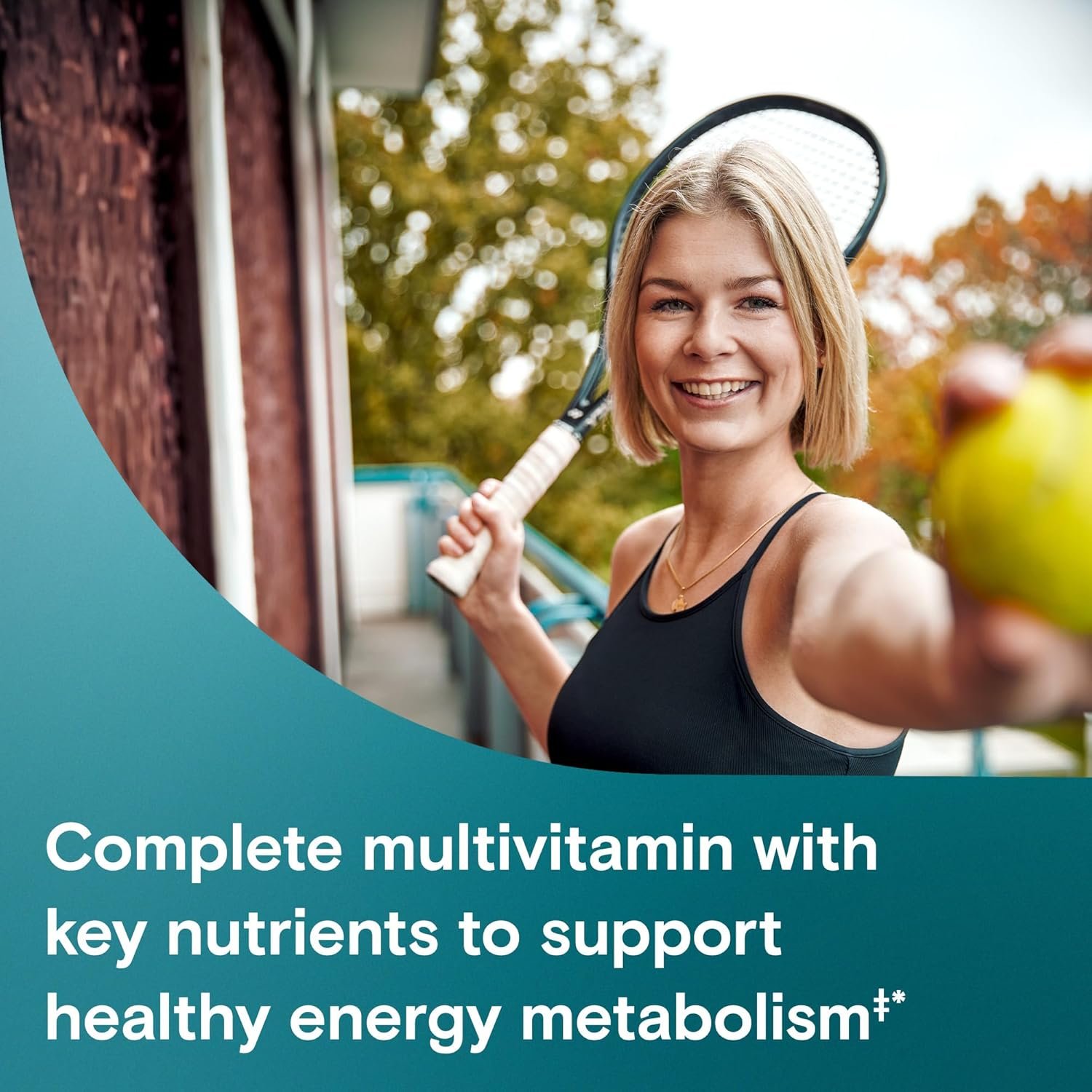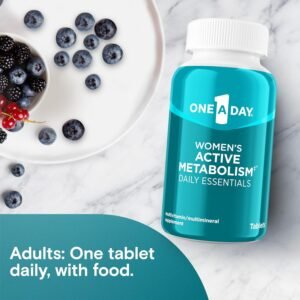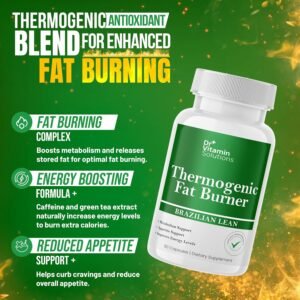What if you could support your weight loss journey after 40 with the right vitamins? If you’re approaching or have crossed this milestone, you may have noticed changes in your body that make it more challenging to maintain a healthy weight. This is totally natural, but with the right approach, you can effectively manage those changes. In this article discover the vitamins for weight loss over 40.
Table of Contents
ToggleUnderstanding Vitamins For Weight Loss Over 40
As you transition into your 40s and beyond, several factors come into play regarding weight management. Your metabolism may have slowed down, hormonal shifts can affect how your body stores fat, and lifestyle changes can also impact your energy levels.
Taking a proactive approach can make a significant difference. One aspect you can consider is incorporating specific vitamins into your diet that may help support your weight loss efforts.
Key Vitamins for Weight Loss Over 40
When discussing vitamins that can aid in weight loss, it’s essential to focus on those that support metabolism, energy levels, and overall health. Think of your body as a finely tuned engine; the right fuel can help it run smoothly. Here are some vitamins for weight loss over 40 to consider:
Vitamin D
The Importance of Vitamin D
Vitamin D plays a crucial role in various body functions, including the absorption of calcium and maintaining bone health. More importantly for those focused on weight loss, it is also linked to metabolic function.
How It Affects Weight Loss
Research suggests that individuals with low levels of Vitamin D might struggle with weight management. Low levels of this vitamin can lead to increased fat storage and a stronger craving for carbohydrates, making it harder to stick to a healthy eating plan.
Sources of Vitamin D
Here are some fantastic sources of Vitamin D that can help you maintain optimal levels:
| Food Source | Vitamin D Content |
|---|---|
| Fatty fish (salmon, mackerel) | 570–1300 IU per 3.5 oz |
| Cod liver oil | 1,360 IU per tablespoon |
| Fortified milk and juices | Around 100 IU per cup |
| Egg yolks | 40 IU per yolk |
| Mushrooms (exposed to UV light) | Varies |
B Vitamins
The Role of B Vitamins
B vitamins are crucial for energy production and can help your body effectively utilize the food you consume. This is particularly important because as you age, your body may not process nutrients as efficiently.
Key B Vitamins for Weight Management
- B1 (Thiamine): Helps convert carbohydrates into energy and aids in overall metabolism.
- B3 (Niacin): Supports fat metabolism and can increase HDL (good cholesterol).
- B6 (Pyridoxine): Contributes to protein metabolism and can help with appetite regulation.
- B12 (Cobalamin): Essential for energy production and can boost your metabolism.
Sources of B Vitamins
You might want to incorporate the following foods into your diet to get an ample supply of B vitamins:
| B Vitamin | Food Sources |
|---|---|
| B1 (Thiamine) | Whole grains, pork, nuts |
| B3 (Niacin) | Turkey, chicken, fish, nuts |
| B6 (Pyridoxine) | Fish, potatoes, chickpeas |
| B12 (Cobalamin) | Meat, dairy products, fortified cereals |
Vitamin C
The Value of Vitamin C
Vitamin C is known for its immune-boosting properties, but it also plays a notable role in weight loss. It helps regulate cortisol levels, a hormone linked to stress and weight gain.
How It Supports Weight Loss
Higher levels of Vitamin C in your body can lead to increased fat oxidation, particularly during exercise. This means that when you engage in physical activity, your body may be more likely to burn fat when you have adequate Vitamin C levels.
Sources of Vitamin C
You can find Vitamin C in a variety of delicious and healthy foods:
| Food Source | Vitamin C Content |
|---|---|
| Oranges | 70 mg per medium orange |
| Strawberries | 98 mg per cup |
| Kiwi | 71 mg per fruit |
| Bell peppers | 190 mg per medium pepper |
| Broccoli | 81 mg per half-cup |
Vitamin E
Why Vitamin E Matters
Vitamin E is a powerful antioxidant that helps combat oxidative stress in the body. As you age, the importance of antioxidants becomes even more crucial for managing weight and overall well-being.
Its Role in Weight Management
Research indicates that Vitamin E may play a role in preventing age-related obesity by enhancing metabolic processes and reducing inflammation, which often correlates with weight gain.
Sources of Vitamin E
To incorporate more Vitamin E into your diet, consider these sources:
| Food Source | Vitamin E Content |
|---|---|
| Almonds | 7.3 mg per ounce |
| Spinach | 3.7 mg per half-cup |
| Sweet potatoes | 0.7 mg per half-cup |
| Avocado | 2.1 mg per fruit |
| Olive oil | 1.9 mg per tablespoon |
Omega-3 Fatty Acids
The Surprising Benefits of Omega-3s
While not a vitamin in the traditional sense, Omega-3 fatty acids are essential nutrients that can significantly aid your weight loss journey. These healthy fats are paramount for heart health and have anti-inflammatory properties.
Why They Help with Weight Loss
Omega-3s can help regulate appetite and fat storage, making it easier to maintain a healthy weight. Additionally, they support muscle mass retention during weight loss, which is crucial for sustaining long-term results.
Sources of Omega-3 Fatty Acids
To reap the benefits of Omega-3s, you can include the following foods:
| Food Source | Omega-3 Content |
|---|---|
| Fatty fish (salmon, sardines) | 1,000–3,000 mg per serving |
| Chia seeds | 5,060 mg per ounce |
| Flaxseeds | 2,350 mg per tablespoon |
| Walnuts | 2,570 mg per ounce |
| Hemp seeds | 6,000 mg per ounce |
Supplementing Your Vitamin Intake
While it’s always preferable to get your vitamins from natural food sources, there are times when supplementation might be beneficial. If your diet doesn’t provide enough of these crucial vitamins and nutrients, considering the best the best vitamins for weight loss over 40 or a specific vitamin supplement may be a wise choice.
When to Consider Supplements
- Dietary Restrictions: If you’re vegan, vegetarian, or have allergies, you might struggle to get enough of certain vitamins.
- Busy Lifestyles: Sometimes, our routines can prevent us from maintaining a balanced diet. In these cases, a supplement can help fill gaps.
- Medical Conditions: Certain health issues can inhibit nutrient absorption or increase your nutrient needs.
Choosing the Right Supplements
When looking for supplements, here are some tips:
- Quality Matters: Opt for high-quality, reputable brands. Check for third-party testing for purity and potency.
- Expert Advice: Consider consulting a healthcare professional to determine which vitamins you may need and to discuss dosages.
- Balance is Key: Be wary of mega-doses of any vitamin. More is not always better, and too much of certain vitamins can lead to adverse effects.
Lifestyle Changes to Complement Vitamin Intake
Incorporating vitamins into your diet is just one piece of the weight loss puzzle. Making sustainable lifestyle changes can further enhance your journey:
Healthy Eating Habits
- Focus on Whole Foods: Prioritize fruits, vegetables, lean proteins, and whole grains.
- Stay Hydrated: Don’t underestimate the power of water! Staying hydrated can help control hunger and increase metabolism.
- Watch Portion Sizes: Being mindful of portion sizes can make a significant difference without feeling deprived.
Regular Physical Activity
Engaging in regular exercise is vital. Aim for a mix of cardiovascular (aerobic) and strength-training activities:
- Aerobic Activities: Aim for at least 150 minutes of moderate aerobic activities weekly. Walking, cycling, and swimming are excellent options.
- Strength Training: Try to include muscle-strengthening activities on two or more days per week to help maintain muscle mass as you lose weight.
Stress Management
Stress plays a significant role in weight gain and may lead to emotional eating. Incorporating stress-reducing practices can help:
- Mindfulness and Meditation: Regular mindfulness practices can help reduce stress and improve mental clarity.
- Sleep Hygiene: Prioritize quality sleep, aiming for 7-9 hours per night to support overall health and metabolism.
Monitoring Your Progress
As you embark on this journey of integrating vitamins and other lifestyle changes, keeping track of your progress is vital. Having a clear understanding of what works for you can motivate you to stay on course.
Tracking Food Intake
Consider using a food journal or an app to log your meals and snacks. This can help you identify patterns in your eating habits and areas where you can make adjustments.
Setting Realistic Goals
Set achievable weight loss goals. Instead of aiming for rapid weight loss, focus on gradual and sustainable changes. Aiming to lose 1-2 pounds per week is a healthy target.
Seek Support
Don’t hesitate to seek support from friends, family, or weight loss groups. Having a support network can significantly contribute to your success.
Conclusion
As you navigate the journey of vitamins for weight loss over 40, remember that small, consistent changes can lead to remarkable results. Incorporating essential vitamins and making lifestyle adjustments will support your efforts to achieve and maintain a healthy weight.
By focusing on vitamins like D, B, C, E, and Omega-3s, alongside mindful eating and exercise, you’re setting yourself up for long-term success. Best of luck on your journey to vibrant health and wellness!
Imagine the possibilities ahead; feeling energized, confident, and ready to take on whatever challenges come your way. With the right approach, you can turn your goals into reality!
Get The Best Vitamins For Weight Loss Over 40






